Will Internet Replace Books? A Study on Learning Technologies
VerifiedAdded on 2021/04/24
|8
|2519
|326
Essay
AI Summary
This essay analyzes the impact of internet technologies on books as a primary learning tool, referencing works by Johnson, Rosen, Carr, and Le Guin. It explores the shift from print books to e-books and online learning resources, examining the benefits of accessibility, flexibility, and information richness. The essay discusses the arguments of each author, highlighting the effects of technology on reading habits, cognitive processes, and the evolution of learning methods. It provides examples, such as the use of the internet for students with special needs and in classroom settings, to illustrate the changing landscape of education and the potential for internet technologies to replace books as the chief learning tool. The essay concludes that the continuous growth and development of technology indicate that online resources will likely become the dominant learning tool in the future.
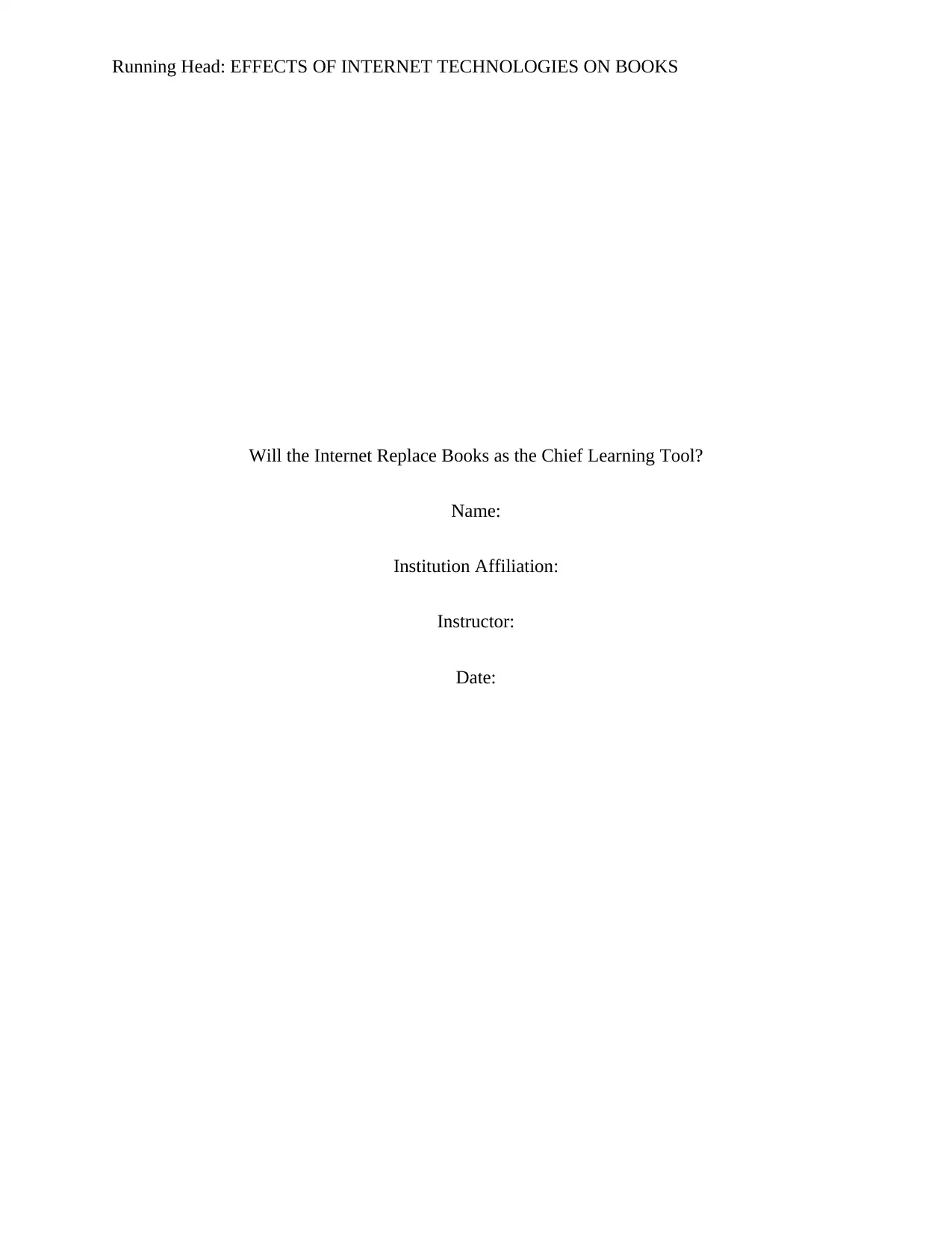
Running Head: EFFECTS OF INTERNET TECHNOLOGIES ON BOOKS
Will the Internet Replace Books as the Chief Learning Tool?
Name:
Institution Affiliation:
Instructor:
Date:
Will the Internet Replace Books as the Chief Learning Tool?
Name:
Institution Affiliation:
Instructor:
Date:
Paraphrase This Document
Need a fresh take? Get an instant paraphrase of this document with our AI Paraphraser
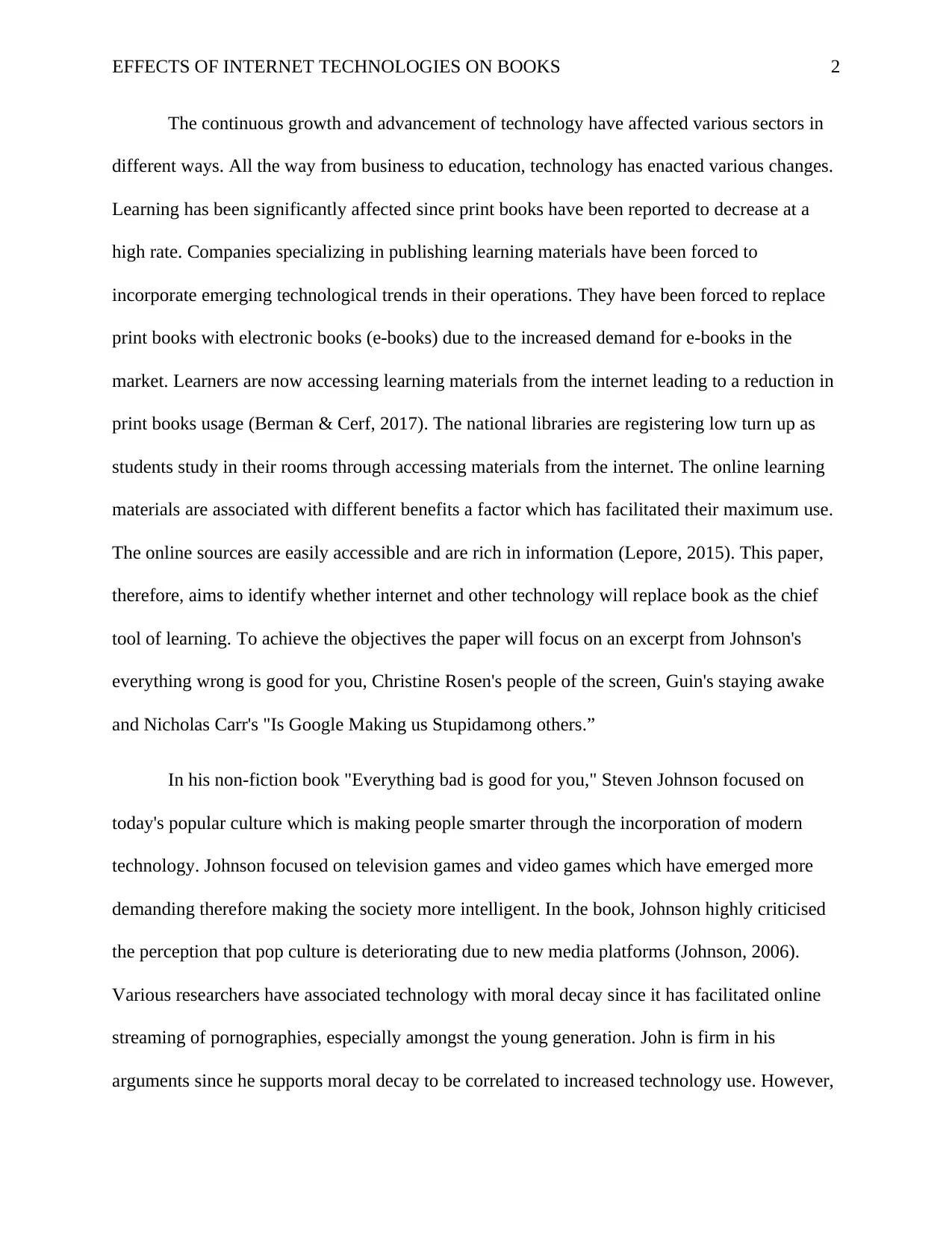
EFFECTS OF INTERNET TECHNOLOGIES ON BOOKS 2
The continuous growth and advancement of technology have affected various sectors in
different ways. All the way from business to education, technology has enacted various changes.
Learning has been significantly affected since print books have been reported to decrease at a
high rate. Companies specializing in publishing learning materials have been forced to
incorporate emerging technological trends in their operations. They have been forced to replace
print books with electronic books (e-books) due to the increased demand for e-books in the
market. Learners are now accessing learning materials from the internet leading to a reduction in
print books usage (Berman & Cerf, 2017). The national libraries are registering low turn up as
students study in their rooms through accessing materials from the internet. The online learning
materials are associated with different benefits a factor which has facilitated their maximum use.
The online sources are easily accessible and are rich in information (Lepore, 2015). This paper,
therefore, aims to identify whether internet and other technology will replace book as the chief
tool of learning. To achieve the objectives the paper will focus on an excerpt from Johnson's
everything wrong is good for you, Christine Rosen's people of the screen, Guin's staying awake
and Nicholas Carr's "Is Google Making us Stupidamong others.”
In his non-fiction book "Everything bad is good for you," Steven Johnson focused on
today's popular culture which is making people smarter through the incorporation of modern
technology. Johnson focused on television games and video games which have emerged more
demanding therefore making the society more intelligent. In the book, Johnson highly criticised
the perception that pop culture is deteriorating due to new media platforms (Johnson, 2006).
Various researchers have associated technology with moral decay since it has facilitated online
streaming of pornographies, especially amongst the young generation. John is firm in his
arguments since he supports moral decay to be correlated to increased technology use. However,
The continuous growth and advancement of technology have affected various sectors in
different ways. All the way from business to education, technology has enacted various changes.
Learning has been significantly affected since print books have been reported to decrease at a
high rate. Companies specializing in publishing learning materials have been forced to
incorporate emerging technological trends in their operations. They have been forced to replace
print books with electronic books (e-books) due to the increased demand for e-books in the
market. Learners are now accessing learning materials from the internet leading to a reduction in
print books usage (Berman & Cerf, 2017). The national libraries are registering low turn up as
students study in their rooms through accessing materials from the internet. The online learning
materials are associated with different benefits a factor which has facilitated their maximum use.
The online sources are easily accessible and are rich in information (Lepore, 2015). This paper,
therefore, aims to identify whether internet and other technology will replace book as the chief
tool of learning. To achieve the objectives the paper will focus on an excerpt from Johnson's
everything wrong is good for you, Christine Rosen's people of the screen, Guin's staying awake
and Nicholas Carr's "Is Google Making us Stupidamong others.”
In his non-fiction book "Everything bad is good for you," Steven Johnson focused on
today's popular culture which is making people smarter through the incorporation of modern
technology. Johnson focused on television games and video games which have emerged more
demanding therefore making the society more intelligent. In the book, Johnson highly criticised
the perception that pop culture is deteriorating due to new media platforms (Johnson, 2006).
Various researchers have associated technology with moral decay since it has facilitated online
streaming of pornographies, especially amongst the young generation. John is firm in his
arguments since he supports moral decay to be correlated to increased technology use. However,
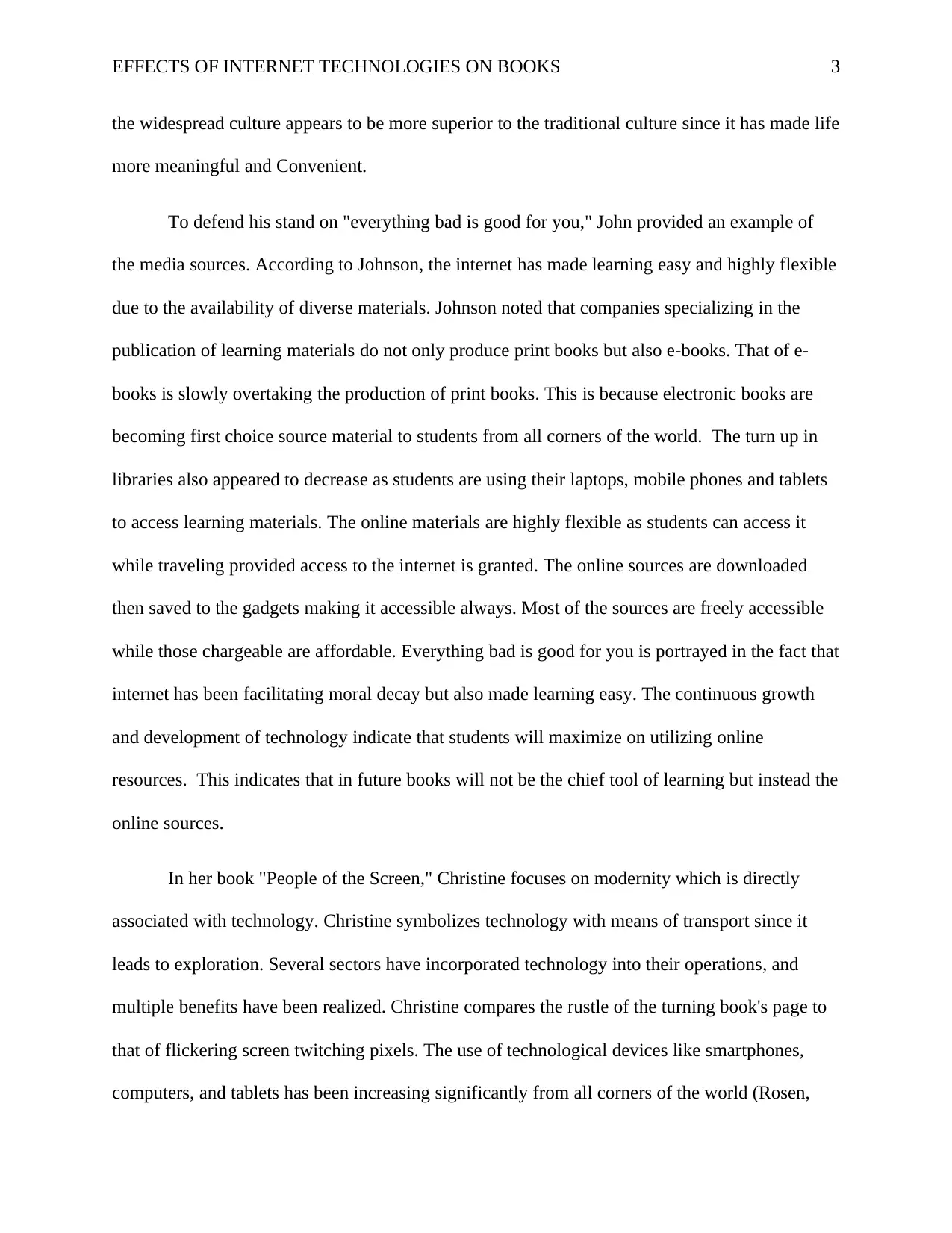
EFFECTS OF INTERNET TECHNOLOGIES ON BOOKS 3
the widespread culture appears to be more superior to the traditional culture since it has made life
more meaningful and Convenient.
To defend his stand on "everything bad is good for you," John provided an example of
the media sources. According to Johnson, the internet has made learning easy and highly flexible
due to the availability of diverse materials. Johnson noted that companies specializing in the
publication of learning materials do not only produce print books but also e-books. That of e-
books is slowly overtaking the production of print books. This is because electronic books are
becoming first choice source material to students from all corners of the world. The turn up in
libraries also appeared to decrease as students are using their laptops, mobile phones and tablets
to access learning materials. The online materials are highly flexible as students can access it
while traveling provided access to the internet is granted. The online sources are downloaded
then saved to the gadgets making it accessible always. Most of the sources are freely accessible
while those chargeable are affordable. Everything bad is good for you is portrayed in the fact that
internet has been facilitating moral decay but also made learning easy. The continuous growth
and development of technology indicate that students will maximize on utilizing online
resources. This indicates that in future books will not be the chief tool of learning but instead the
online sources.
In her book "People of the Screen," Christine focuses on modernity which is directly
associated with technology. Christine symbolizes technology with means of transport since it
leads to exploration. Several sectors have incorporated technology into their operations, and
multiple benefits have been realized. Christine compares the rustle of the turning book's page to
that of flickering screen twitching pixels. The use of technological devices like smartphones,
computers, and tablets has been increasing significantly from all corners of the world (Rosen,
the widespread culture appears to be more superior to the traditional culture since it has made life
more meaningful and Convenient.
To defend his stand on "everything bad is good for you," John provided an example of
the media sources. According to Johnson, the internet has made learning easy and highly flexible
due to the availability of diverse materials. Johnson noted that companies specializing in the
publication of learning materials do not only produce print books but also e-books. That of e-
books is slowly overtaking the production of print books. This is because electronic books are
becoming first choice source material to students from all corners of the world. The turn up in
libraries also appeared to decrease as students are using their laptops, mobile phones and tablets
to access learning materials. The online materials are highly flexible as students can access it
while traveling provided access to the internet is granted. The online sources are downloaded
then saved to the gadgets making it accessible always. Most of the sources are freely accessible
while those chargeable are affordable. Everything bad is good for you is portrayed in the fact that
internet has been facilitating moral decay but also made learning easy. The continuous growth
and development of technology indicate that students will maximize on utilizing online
resources. This indicates that in future books will not be the chief tool of learning but instead the
online sources.
In her book "People of the Screen," Christine focuses on modernity which is directly
associated with technology. Christine symbolizes technology with means of transport since it
leads to exploration. Several sectors have incorporated technology into their operations, and
multiple benefits have been realized. Christine compares the rustle of the turning book's page to
that of flickering screen twitching pixels. The use of technological devices like smartphones,
computers, and tablets has been increasing significantly from all corners of the world (Rosen,
⊘ This is a preview!⊘
Do you want full access?
Subscribe today to unlock all pages.

Trusted by 1+ million students worldwide
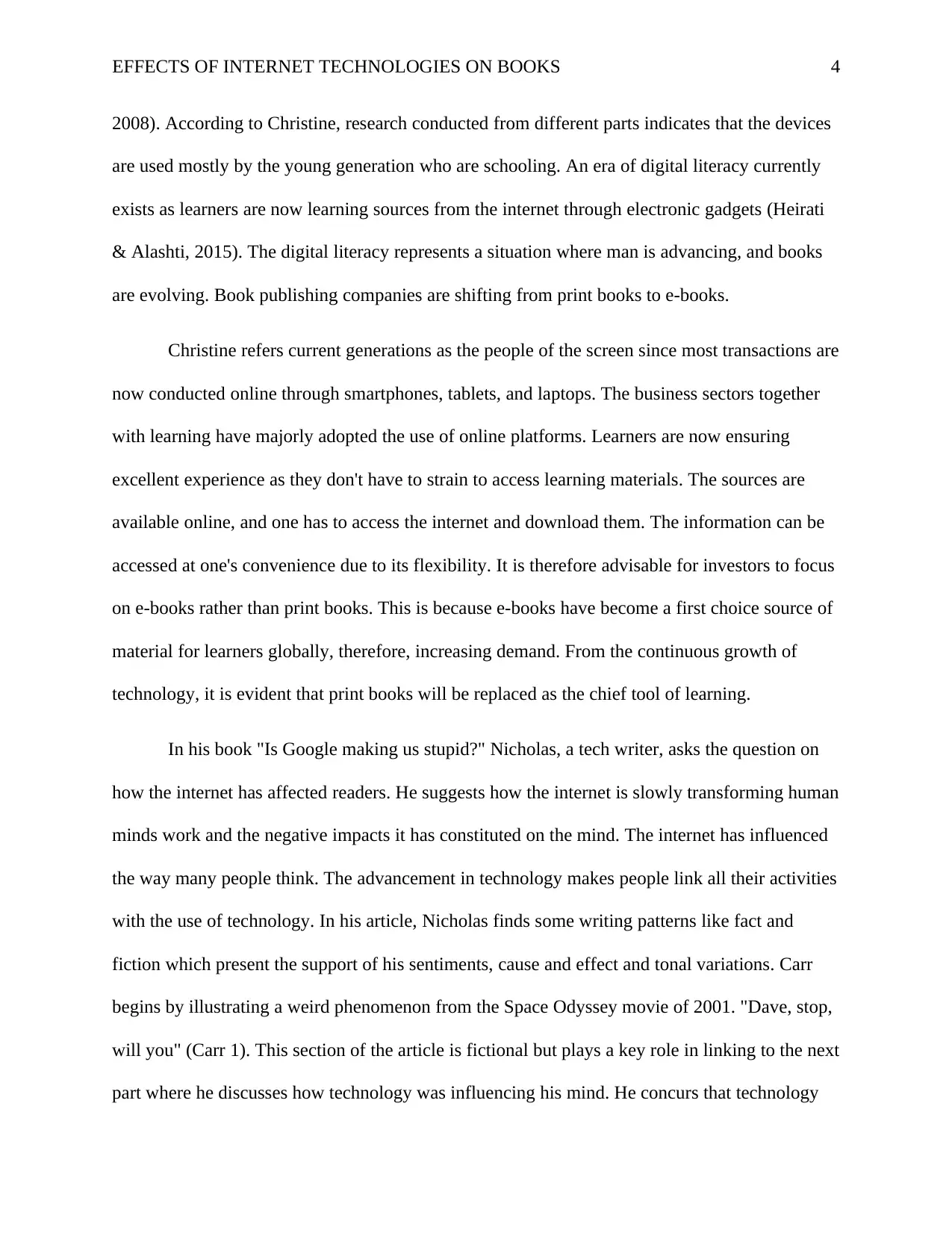
EFFECTS OF INTERNET TECHNOLOGIES ON BOOKS 4
2008). According to Christine, research conducted from different parts indicates that the devices
are used mostly by the young generation who are schooling. An era of digital literacy currently
exists as learners are now learning sources from the internet through electronic gadgets (Heirati
& Alashti, 2015). The digital literacy represents a situation where man is advancing, and books
are evolving. Book publishing companies are shifting from print books to e-books.
Christine refers current generations as the people of the screen since most transactions are
now conducted online through smartphones, tablets, and laptops. The business sectors together
with learning have majorly adopted the use of online platforms. Learners are now ensuring
excellent experience as they don't have to strain to access learning materials. The sources are
available online, and one has to access the internet and download them. The information can be
accessed at one's convenience due to its flexibility. It is therefore advisable for investors to focus
on e-books rather than print books. This is because e-books have become a first choice source of
material for learners globally, therefore, increasing demand. From the continuous growth of
technology, it is evident that print books will be replaced as the chief tool of learning.
In his book "Is Google making us stupid?" Nicholas, a tech writer, asks the question on
how the internet has affected readers. He suggests how the internet is slowly transforming human
minds work and the negative impacts it has constituted on the mind. The internet has influenced
the way many people think. The advancement in technology makes people link all their activities
with the use of technology. In his article, Nicholas finds some writing patterns like fact and
fiction which present the support of his sentiments, cause and effect and tonal variations. Carr
begins by illustrating a weird phenomenon from the Space Odyssey movie of 2001. "Dave, stop,
will you" (Carr 1). This section of the article is fictional but plays a key role in linking to the next
part where he discusses how technology was influencing his mind. He concurs that technology
2008). According to Christine, research conducted from different parts indicates that the devices
are used mostly by the young generation who are schooling. An era of digital literacy currently
exists as learners are now learning sources from the internet through electronic gadgets (Heirati
& Alashti, 2015). The digital literacy represents a situation where man is advancing, and books
are evolving. Book publishing companies are shifting from print books to e-books.
Christine refers current generations as the people of the screen since most transactions are
now conducted online through smartphones, tablets, and laptops. The business sectors together
with learning have majorly adopted the use of online platforms. Learners are now ensuring
excellent experience as they don't have to strain to access learning materials. The sources are
available online, and one has to access the internet and download them. The information can be
accessed at one's convenience due to its flexibility. It is therefore advisable for investors to focus
on e-books rather than print books. This is because e-books have become a first choice source of
material for learners globally, therefore, increasing demand. From the continuous growth of
technology, it is evident that print books will be replaced as the chief tool of learning.
In his book "Is Google making us stupid?" Nicholas, a tech writer, asks the question on
how the internet has affected readers. He suggests how the internet is slowly transforming human
minds work and the negative impacts it has constituted on the mind. The internet has influenced
the way many people think. The advancement in technology makes people link all their activities
with the use of technology. In his article, Nicholas finds some writing patterns like fact and
fiction which present the support of his sentiments, cause and effect and tonal variations. Carr
begins by illustrating a weird phenomenon from the Space Odyssey movie of 2001. "Dave, stop,
will you" (Carr 1). This section of the article is fictional but plays a key role in linking to the next
part where he discusses how technology was influencing his mind. He concurs that technology
Paraphrase This Document
Need a fresh take? Get an instant paraphrase of this document with our AI Paraphraser
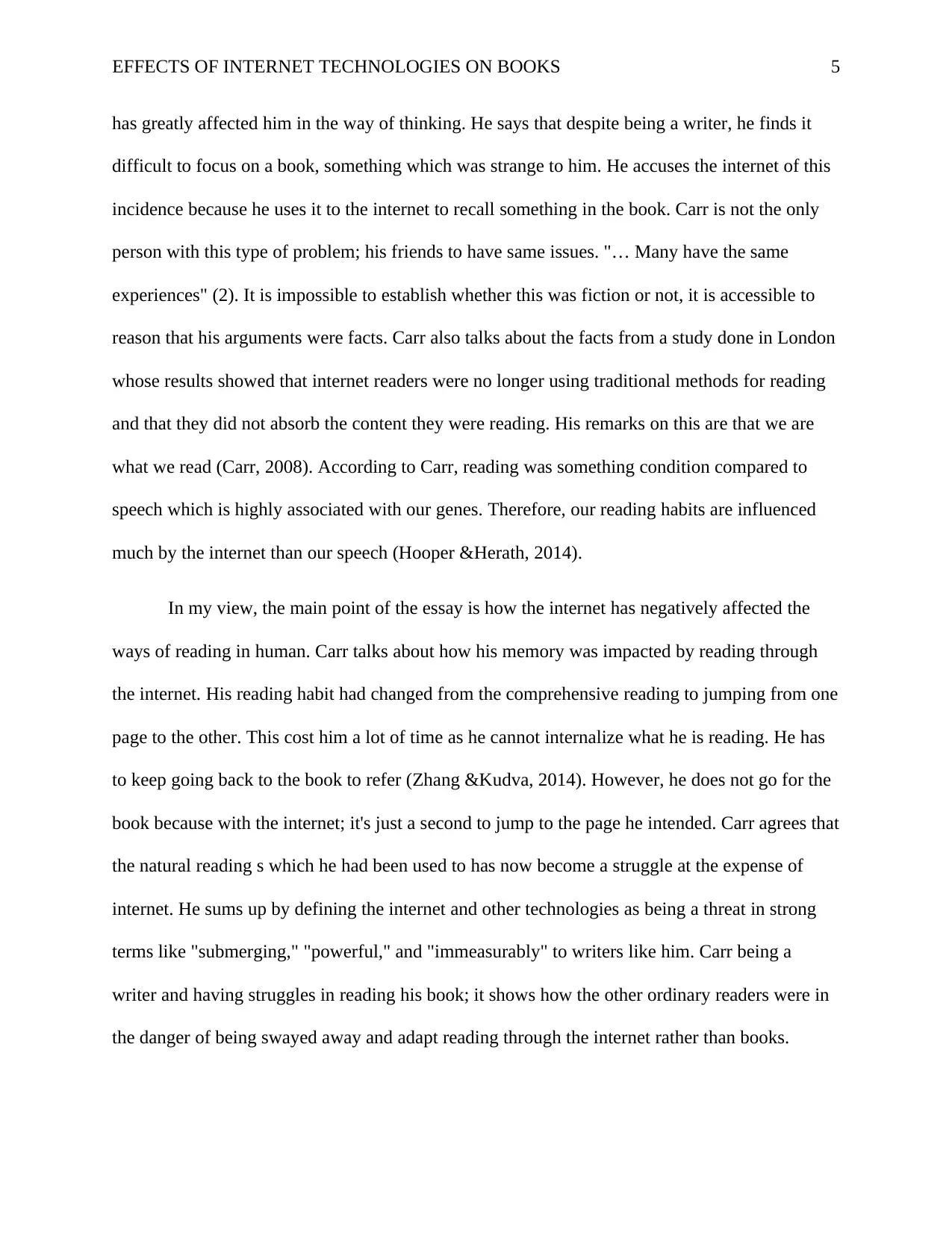
EFFECTS OF INTERNET TECHNOLOGIES ON BOOKS 5
has greatly affected him in the way of thinking. He says that despite being a writer, he finds it
difficult to focus on a book, something which was strange to him. He accuses the internet of this
incidence because he uses it to the internet to recall something in the book. Carr is not the only
person with this type of problem; his friends to have same issues. "… Many have the same
experiences" (2). It is impossible to establish whether this was fiction or not, it is accessible to
reason that his arguments were facts. Carr also talks about the facts from a study done in London
whose results showed that internet readers were no longer using traditional methods for reading
and that they did not absorb the content they were reading. His remarks on this are that we are
what we read (Carr, 2008). According to Carr, reading was something condition compared to
speech which is highly associated with our genes. Therefore, our reading habits are influenced
much by the internet than our speech (Hooper &Herath, 2014).
In my view, the main point of the essay is how the internet has negatively affected the
ways of reading in human. Carr talks about how his memory was impacted by reading through
the internet. His reading habit had changed from the comprehensive reading to jumping from one
page to the other. This cost him a lot of time as he cannot internalize what he is reading. He has
to keep going back to the book to refer (Zhang &Kudva, 2014). However, he does not go for the
book because with the internet; it's just a second to jump to the page he intended. Carr agrees that
the natural reading s which he had been used to has now become a struggle at the expense of
internet. He sums up by defining the internet and other technologies as being a threat in strong
terms like "submerging," "powerful," and "immeasurably" to writers like him. Carr being a
writer and having struggles in reading his book; it shows how the other ordinary readers were in
the danger of being swayed away and adapt reading through the internet rather than books.
has greatly affected him in the way of thinking. He says that despite being a writer, he finds it
difficult to focus on a book, something which was strange to him. He accuses the internet of this
incidence because he uses it to the internet to recall something in the book. Carr is not the only
person with this type of problem; his friends to have same issues. "… Many have the same
experiences" (2). It is impossible to establish whether this was fiction or not, it is accessible to
reason that his arguments were facts. Carr also talks about the facts from a study done in London
whose results showed that internet readers were no longer using traditional methods for reading
and that they did not absorb the content they were reading. His remarks on this are that we are
what we read (Carr, 2008). According to Carr, reading was something condition compared to
speech which is highly associated with our genes. Therefore, our reading habits are influenced
much by the internet than our speech (Hooper &Herath, 2014).
In my view, the main point of the essay is how the internet has negatively affected the
ways of reading in human. Carr talks about how his memory was impacted by reading through
the internet. His reading habit had changed from the comprehensive reading to jumping from one
page to the other. This cost him a lot of time as he cannot internalize what he is reading. He has
to keep going back to the book to refer (Zhang &Kudva, 2014). However, he does not go for the
book because with the internet; it's just a second to jump to the page he intended. Carr agrees that
the natural reading s which he had been used to has now become a struggle at the expense of
internet. He sums up by defining the internet and other technologies as being a threat in strong
terms like "submerging," "powerful," and "immeasurably" to writers like him. Carr being a
writer and having struggles in reading his book; it shows how the other ordinary readers were in
the danger of being swayed away and adapt reading through the internet rather than books.
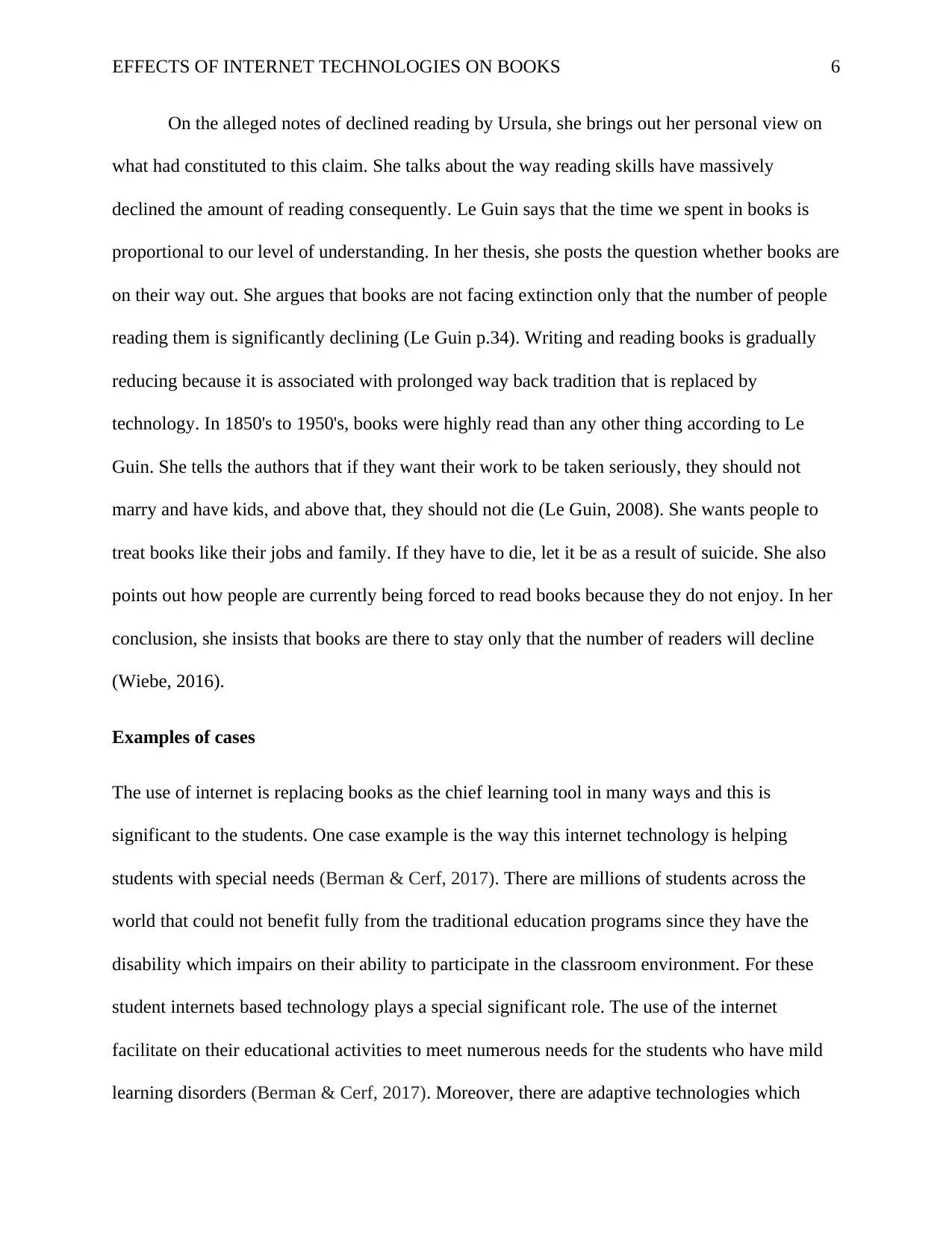
EFFECTS OF INTERNET TECHNOLOGIES ON BOOKS 6
On the alleged notes of declined reading by Ursula, she brings out her personal view on
what had constituted to this claim. She talks about the way reading skills have massively
declined the amount of reading consequently. Le Guin says that the time we spent in books is
proportional to our level of understanding. In her thesis, she posts the question whether books are
on their way out. She argues that books are not facing extinction only that the number of people
reading them is significantly declining (Le Guin p.34). Writing and reading books is gradually
reducing because it is associated with prolonged way back tradition that is replaced by
technology. In 1850's to 1950's, books were highly read than any other thing according to Le
Guin. She tells the authors that if they want their work to be taken seriously, they should not
marry and have kids, and above that, they should not die (Le Guin, 2008). She wants people to
treat books like their jobs and family. If they have to die, let it be as a result of suicide. She also
points out how people are currently being forced to read books because they do not enjoy. In her
conclusion, she insists that books are there to stay only that the number of readers will decline
(Wiebe, 2016).
Examples of cases
The use of internet is replacing books as the chief learning tool in many ways and this is
significant to the students. One case example is the way this internet technology is helping
students with special needs (Berman & Cerf, 2017). There are millions of students across the
world that could not benefit fully from the traditional education programs since they have the
disability which impairs on their ability to participate in the classroom environment. For these
student internets based technology plays a special significant role. The use of the internet
facilitate on their educational activities to meet numerous needs for the students who have mild
learning disorders (Berman & Cerf, 2017). Moreover, there are adaptive technologies which
On the alleged notes of declined reading by Ursula, she brings out her personal view on
what had constituted to this claim. She talks about the way reading skills have massively
declined the amount of reading consequently. Le Guin says that the time we spent in books is
proportional to our level of understanding. In her thesis, she posts the question whether books are
on their way out. She argues that books are not facing extinction only that the number of people
reading them is significantly declining (Le Guin p.34). Writing and reading books is gradually
reducing because it is associated with prolonged way back tradition that is replaced by
technology. In 1850's to 1950's, books were highly read than any other thing according to Le
Guin. She tells the authors that if they want their work to be taken seriously, they should not
marry and have kids, and above that, they should not die (Le Guin, 2008). She wants people to
treat books like their jobs and family. If they have to die, let it be as a result of suicide. She also
points out how people are currently being forced to read books because they do not enjoy. In her
conclusion, she insists that books are there to stay only that the number of readers will decline
(Wiebe, 2016).
Examples of cases
The use of internet is replacing books as the chief learning tool in many ways and this is
significant to the students. One case example is the way this internet technology is helping
students with special needs (Berman & Cerf, 2017). There are millions of students across the
world that could not benefit fully from the traditional education programs since they have the
disability which impairs on their ability to participate in the classroom environment. For these
student internets based technology plays a special significant role. The use of the internet
facilitate on their educational activities to meet numerous needs for the students who have mild
learning disorders (Berman & Cerf, 2017). Moreover, there are adaptive technologies which
⊘ This is a preview!⊘
Do you want full access?
Subscribe today to unlock all pages.

Trusted by 1+ million students worldwide
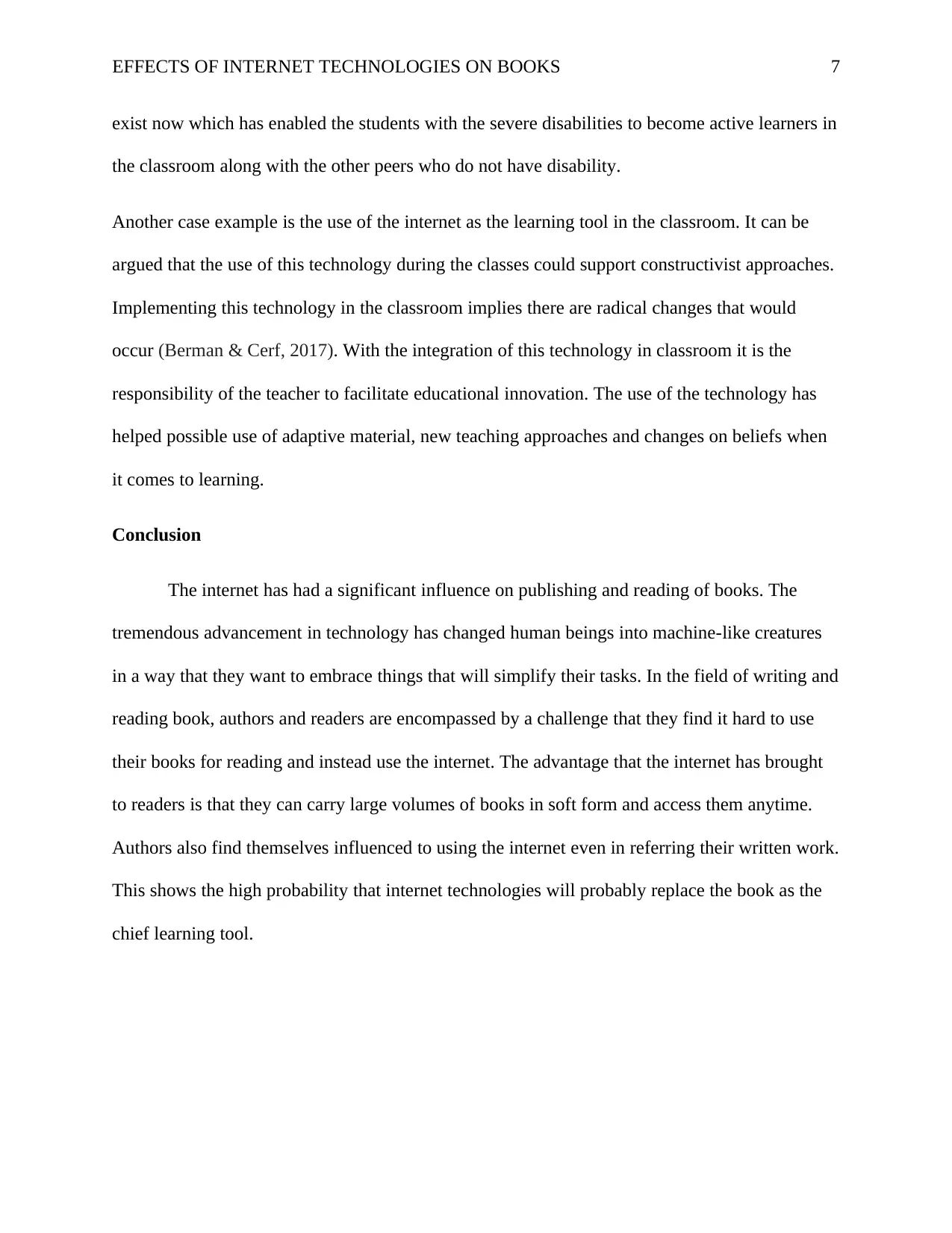
EFFECTS OF INTERNET TECHNOLOGIES ON BOOKS 7
exist now which has enabled the students with the severe disabilities to become active learners in
the classroom along with the other peers who do not have disability.
Another case example is the use of the internet as the learning tool in the classroom. It can be
argued that the use of this technology during the classes could support constructivist approaches.
Implementing this technology in the classroom implies there are radical changes that would
occur (Berman & Cerf, 2017). With the integration of this technology in classroom it is the
responsibility of the teacher to facilitate educational innovation. The use of the technology has
helped possible use of adaptive material, new teaching approaches and changes on beliefs when
it comes to learning.
Conclusion
The internet has had a significant influence on publishing and reading of books. The
tremendous advancement in technology has changed human beings into machine-like creatures
in a way that they want to embrace things that will simplify their tasks. In the field of writing and
reading book, authors and readers are encompassed by a challenge that they find it hard to use
their books for reading and instead use the internet. The advantage that the internet has brought
to readers is that they can carry large volumes of books in soft form and access them anytime.
Authors also find themselves influenced to using the internet even in referring their written work.
This shows the high probability that internet technologies will probably replace the book as the
chief learning tool.
exist now which has enabled the students with the severe disabilities to become active learners in
the classroom along with the other peers who do not have disability.
Another case example is the use of the internet as the learning tool in the classroom. It can be
argued that the use of this technology during the classes could support constructivist approaches.
Implementing this technology in the classroom implies there are radical changes that would
occur (Berman & Cerf, 2017). With the integration of this technology in classroom it is the
responsibility of the teacher to facilitate educational innovation. The use of the technology has
helped possible use of adaptive material, new teaching approaches and changes on beliefs when
it comes to learning.
Conclusion
The internet has had a significant influence on publishing and reading of books. The
tremendous advancement in technology has changed human beings into machine-like creatures
in a way that they want to embrace things that will simplify their tasks. In the field of writing and
reading book, authors and readers are encompassed by a challenge that they find it hard to use
their books for reading and instead use the internet. The advantage that the internet has brought
to readers is that they can carry large volumes of books in soft form and access them anytime.
Authors also find themselves influenced to using the internet even in referring their written work.
This shows the high probability that internet technologies will probably replace the book as the
chief learning tool.
Paraphrase This Document
Need a fresh take? Get an instant paraphrase of this document with our AI Paraphraser
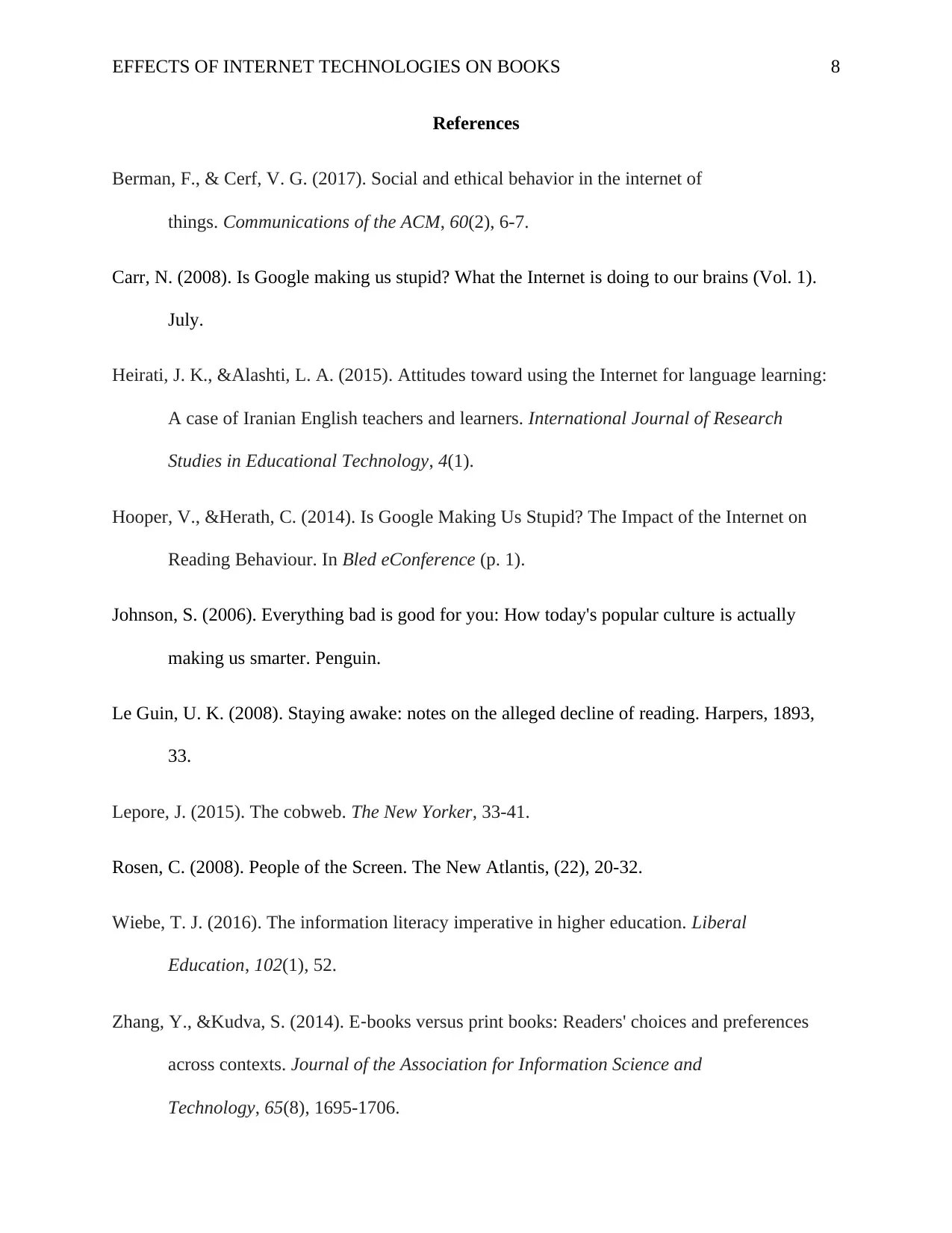
EFFECTS OF INTERNET TECHNOLOGIES ON BOOKS 8
References
Berman, F., & Cerf, V. G. (2017). Social and ethical behavior in the internet of
things. Communications of the ACM, 60(2), 6-7.
Carr, N. (2008). Is Google making us stupid? What the Internet is doing to our brains (Vol. 1).
July.
Heirati, J. K., &Alashti, L. A. (2015). Attitudes toward using the Internet for language learning:
A case of Iranian English teachers and learners. International Journal of Research
Studies in Educational Technology, 4(1).
Hooper, V., &Herath, C. (2014). Is Google Making Us Stupid? The Impact of the Internet on
Reading Behaviour. In Bled eConference (p. 1).
Johnson, S. (2006). Everything bad is good for you: How today's popular culture is actually
making us smarter. Penguin.
Le Guin, U. K. (2008). Staying awake: notes on the alleged decline of reading. Harpers, 1893,
33.
Lepore, J. (2015). The cobweb. The New Yorker, 33-41.
Rosen, C. (2008). People of the Screen. The New Atlantis, (22), 20-32.
Wiebe, T. J. (2016). The information literacy imperative in higher education. Liberal
Education, 102(1), 52.
Zhang, Y., &Kudva, S. (2014). E‐books versus print books: Readers' choices and preferences
across contexts. Journal of the Association for Information Science and
Technology, 65(8), 1695-1706.
References
Berman, F., & Cerf, V. G. (2017). Social and ethical behavior in the internet of
things. Communications of the ACM, 60(2), 6-7.
Carr, N. (2008). Is Google making us stupid? What the Internet is doing to our brains (Vol. 1).
July.
Heirati, J. K., &Alashti, L. A. (2015). Attitudes toward using the Internet for language learning:
A case of Iranian English teachers and learners. International Journal of Research
Studies in Educational Technology, 4(1).
Hooper, V., &Herath, C. (2014). Is Google Making Us Stupid? The Impact of the Internet on
Reading Behaviour. In Bled eConference (p. 1).
Johnson, S. (2006). Everything bad is good for you: How today's popular culture is actually
making us smarter. Penguin.
Le Guin, U. K. (2008). Staying awake: notes on the alleged decline of reading. Harpers, 1893,
33.
Lepore, J. (2015). The cobweb. The New Yorker, 33-41.
Rosen, C. (2008). People of the Screen. The New Atlantis, (22), 20-32.
Wiebe, T. J. (2016). The information literacy imperative in higher education. Liberal
Education, 102(1), 52.
Zhang, Y., &Kudva, S. (2014). E‐books versus print books: Readers' choices and preferences
across contexts. Journal of the Association for Information Science and
Technology, 65(8), 1695-1706.
1 out of 8
Your All-in-One AI-Powered Toolkit for Academic Success.
+13062052269
info@desklib.com
Available 24*7 on WhatsApp / Email
![[object Object]](/_next/static/media/star-bottom.7253800d.svg)
Unlock your academic potential
Copyright © 2020–2026 A2Z Services. All Rights Reserved. Developed and managed by ZUCOL.